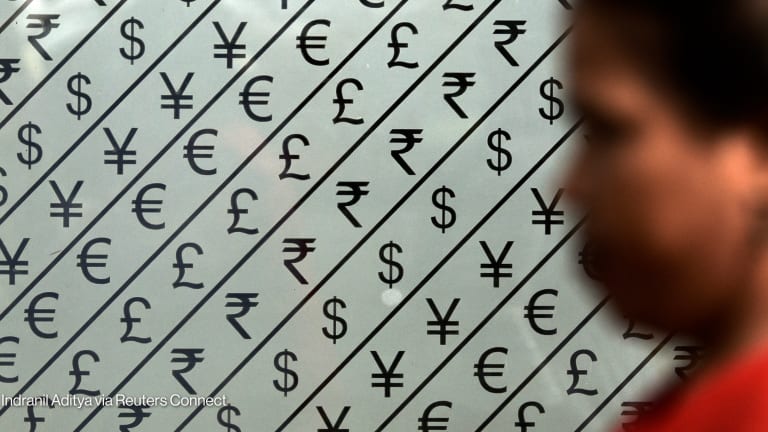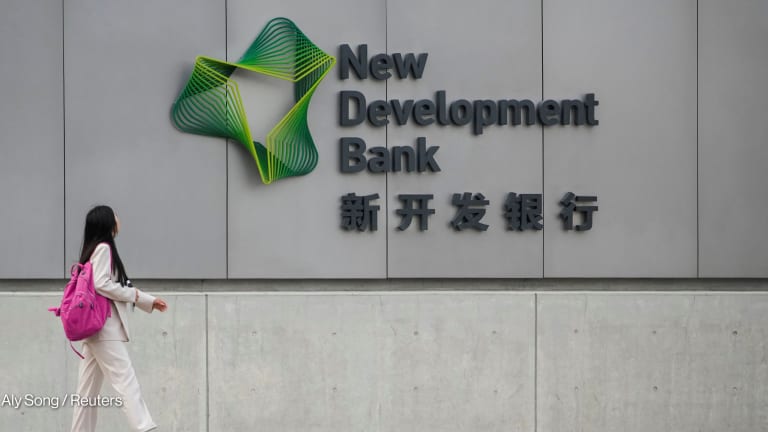Inside EBRD’s €10.8B pipeline in 2021
As of last year, the European Bank for Reconstruction and Development had €10.8 billion worth of projects in its pipeline. Where's the money going? Devex analyzed the data to find out.
Commitments made by the European Bank for Reconstruction and Development fell last year, according to its 2021 financial report. Total commitments from the bank, which provides development finance in Europe, Central Asia, northern Africa, and the Middle East, amounted to €10.4 billion — €549 million less than the previous year. But looking at EBRD’s broader project pipeline in 2021, Devex found nearly €10.8 billion of potential funding that covered not just commitments but also allocations, disbursements, and planned financing. This figure includes: • €3 billion for projects in the disbursing stage — that is, projects that are in progress or in the implementation stage. • €3.4 billion for signed projects — those that have been signed by EBRD and the borrower. • €4.1 billion for approved projects — in other words, projects that have been approved by EBRD’s board of directors. • €331.1 million for forecast projects — those that are still in the pre-approval stage. It is important to note that the project amounts are not final. And although most of the projects are co-financed by other institutions, these numbers only cover EBRD’s contribution. Let’s dig into the data to see where EBRD put its money in 2021. Geographic priorities EBRD works in 38 economies. A bulk of its project financing is channeled through private institutions — €6.5 billion, or 60% of the €10.8 billion, compared with almost €4.3 billion channeled through public institutions. Its projects range from upgrading transport systems and strengthening social services to supporting a green economy. Among the countries it provides financing for, the biggest portion of money went to Turkey, worth €1.5 billion. This includes €549.8 million for 13 ongoing projects, €466.3 million for 10 signed projects, and €511.4 million for two approved projects. Greece ranked next, with €1.1 billion — €180.2 million for three ongoing projects, €413.5 million for 12 signed projects, and €500 million for an approved project. Egypt also received a significant amount, worth €867 million. That includes €176.2 million for six ongoing projects, €301.6 million for five signed projects, €347.5 million for three approved projects, and €41.7 million for three forecast projects. A little over a quarter of EBRD’s financing, worth €2.8 billion, went to regional projects. This includes €91.8 million for five ongoing projects, €562 million for 13 signed projects, and €2.2 billion for four approved projects. Regional projects include investments in green bonds, green cities, and sustainable infrastructure. Sectoral priorities Municipal and environmental infrastructure took the biggest share of the funding by sector, with €3.3 billion. Of this, €223.1 million is allocated for 11 ongoing projects, €645.5 million for 15 signed projects, €2.3 billion for four approved projects, and €81.9 million for three forecast projects. Projects ranged from the rehabilitation of metro lines to the improvement of wastewater management and the construction of climate-resilient housing. The financial institutions sector was another priority, with €3 billion of funding in the pipeline — €1.3 billion for 86 ongoing projects, €805.6 million for 25 signed projects, €890.9 million for 15 approved projects, and €56.7 million for six forecast projects. The projects include on-lending facilities to small and medium-sized enterprises, supporting the expansion of insurance services, and investments to improve financial institutions. Energy ranked next, with €1.8 billion — €655.5 million for 15 ongoing projects, €416.5 million for 10 signed projects, €538.7 million for two approved projects, and €150 million for a forecast project. The projects range from funding the construction of wind farms to upgrading grid systems and power supply, and expanding the distribution of electricity. Biggest projects Pre-approval stage • Up to €150 million for the construction of a tritium removal facility in Romania. • Up to €40 million for investments in energy efficiency in public and residential buildings in Serbia. • Up to €25.6 million ($30 million) for on-lending to private SMEs in Egypt. Approved • Up to €2 billion to support investments under the Green Cities Framework Window II. • Up to €500 million for green economy investments in Turkey. • Up to €500 million to support private sector investments in Greece. Signed • Up to €250 million for the upgrade and electrification of a rail line in Egypt. • Up to €175 million for the upgrade of a one-metric-ton commercial vehicle by Ford Otosan, with electric and hybrid variants, in Turkey. • Up to €167.5 million to finance the development and acquisition of industrial parks in Hungary, Poland, Romania, Serbia, and Slovakia. Disbursing • Up to €150 million to support investments in Arcelik’s manufacturing facilities in Turkey. • Up to €100 million for the construction of a fiber broadband infrastructure in Serbia. • Up to €100 million for on-lending to finance residential energy efficiency projects in Poland. Leon Espenilla contributed data analysis for this article. Try out Devex Pro Funding today with a free 5-day trial, and explore funding opportunities from over 850 sources in addition to our analysis and news content.
Commitments made by the European Bank for Reconstruction and Development fell last year, according to its 2021 financial report. Total commitments from the bank, which provides development finance in Europe, Central Asia, northern Africa, and the Middle East, amounted to €10.4 billion — €549 million less than the previous year.
But looking at EBRD’s broader project pipeline in 2021, Devex found nearly €10.8 billion of potential funding that covered not just commitments but also allocations, disbursements, and planned financing.
This figure includes:
This story is forDevex Promembers
Unlock this story now with a 15-day free trial of Devex Pro.
With a Devex Pro subscription you'll get access to deeper analysis and exclusive insights from our reporters and analysts.
Start my free trialRequest a group subscription Printing articles to share with others is a breach of our terms and conditions and copyright policy. Please use the sharing options on the left side of the article. Devex Pro members may share up to 10 articles per month using the Pro share tool ( ).
Miguel Tamonan is a Senior Development Analyst at Devex, where he analyzes data from public and private donors to produce content and special reports for Pro and Pro Funding readers. He has a bachelor’s degree in Political Science with a Major in International Relations from the Polytechnic University of the Philippines.








